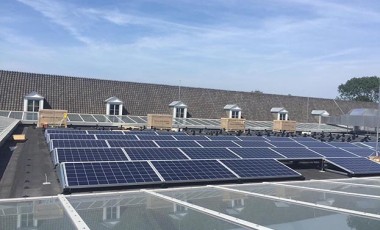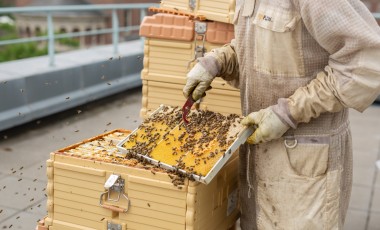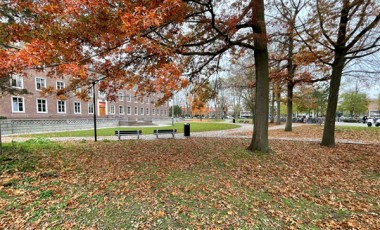Examples



- Buildings & landscaping
With the renovation of the former convent, sustainability is a very important theme in the development of our green campus. A campus which has a park-like appearance and where cycling and taking public transport to and from our workplace are stimulated. BUas is busy reducing energy consumption within its various buildings. Research is underway to explore additional possibilities in this area, for example, triggering behavioural changes among the users of our campus.
- Energy
Energy saving is one of the main priorities on our campus. We are partnering with an external company to reduce our carbon footprint and GHG emissions while creating a roadmap for our strategic priority: achieving climate positivity by 2035. At this moment, we have 363 solar panels on campus (Horizon Building: 263 panels and Ocean Building: 100 panels). We do not use any natural gas on our campus. In addition, we regularly close and switch off energy consumption for two out of three buildings during school holidays and also restrict the opening hours of the buildings.
- Water management
Conscious use of water is an important aspect of a sustainable campus and it is supported at BUas both indoors and outdoors. All tap water on campus is drinkable and, in addition, we have dedicated water bottle refill points indoors and outdoors. The outdoor taps are provided by the regional drinking water company Brabant Water. Water taps across our campus are designed to prevent water waste. They either have motion sensors, or they have to be pushed to turn on and are timed to only release water for a few seconds. One of the reasons for the park-like design of the campus is to retain more water and have it nurture the greenery. Our trees are planted in deeper beds precisely for this reason.
- Single use plastics
As of September 2023, we eliminated disposable cups at BUas. After the first six months of this intervention we estimate to have saved 27,000 disposable cups from being thrown away. Following this move, as of the spring of 2024, all other single use plastic items were discontinued from our campus operations and we fully switched over to china plates, bowls, cups and saucers. Our cutlery is now made from stainless steel and therefore reused of course!
- Waste
We separate our waste on campus divided into four categories. This measure helps us to properly dispose of our waste, though we know we can do more to improve our waste management and we are looking into this as part of our climate positive ambition.
- Procurement
BUas is committed to contributing to the Sustainable Development Goals (SDGs) as part of our BUas+ strategic plan 2022-2025. The procurement and contract management team considers sustainability (in the broadest sense) as a vital aspect in our tenders and contracts, and we take this matter seriously in our evaluations of potential market partners. We have taken a big step forward in signing the Manifesto for Sustainable Procurement and we are now developing a comprehensive action plan as part of this. We are proud that our procurement team were invited as guest speakers during the Dutch National Sustainability Congress 2023 organised by SDG Nederland to share how BUas is achieving more sustainable procurement practices.
- Catering
Our facilities team, in cooperation with the SDG Support Hub (now the Climate & Sustainability programme team), launched an initiative in 2022 to make campus catering more sustainable, both as regards product range and packaging. Goals have been set to make the range of products healthier and more plant-based. Work on these initiatives will continue in the coming months and years, especially to align all our catering with our climate positive ambition. We also have a successful partnership with Too Good To Go to reduce food waste on campus, whereby unsold food is offered at a reduced price to our students.
- Biodiversity
Increasing biodiversity was one of the priorities in developing the campus. Different types of trees, plants and grass create a diverse, mostly self-sustaining ecosystem. To support this ecosystem, a gardener takes care of day-to-day maintenance.
We have beehives on the roof of our Frontier building. The honey produced from the beehive directly goes to our on-campus Sibelicious restaurant. For this reason it is especially important that we have pollinator-friendly flowers on campus and our wild flower meadow areas are very popular and well known in the neighbourhood. This spring, BUas signed up for the Voedselbank voor Bijen initiative, through which we shared packets of native flowers with colleagues and local inhabitants.We actively organise different initiatives to promote biodiversity on campus. We are constantly looking for opportunities to expand biodiversity, for example, by adding insect hotels and rock features to house small mammals. You can see more about biodiversity at BUas in the video below.
- Mobility
The BUas campus has been designed to stimulate sustainable and healthy transport modes. The limited car parking spaces and the open nature of the campus encourage students and staff to walk and cycle where possible. This is further supported and stimulated by a daily commuting allowance which compensates for travels by bicycle and/on foot. We offer 100% reimbursement for our employees' transportation in terms of public transport. In these ways, we encourage our students and employees to walk, cycle and use public transport for their daily commutes.
Biodiversity
At BUas we are committed to contributing to the United Nation’s Sustainable Development Goals. Improving the conditions for biodiversity to flourish even more on our beautiful green campus is one of the areas we are keen to work on.